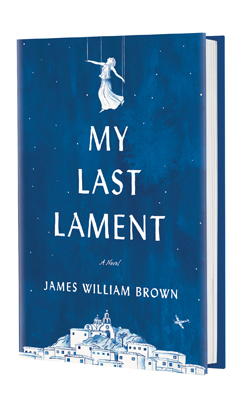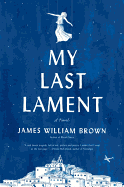My Last Lament
by James William Brown
Aliki, one of the last lamenters in Greece, is dragging the weight of her life behind her in the opening pages of My Last Lament, James William Brown's brilliant work of historical fiction. "There is this about the dead: they're so light. They slip in and out of our world with no effort whatsoever. By contrast, we seem heavy, dragging our lives along behind us like an old sack of stones."
To lessen this burden, Aliki begins to tell the story of her life, speaking into a tape recorder left by a sociologist studying the art of Greek laments. As her memories unfold and unpack themselves, her recounting evolves into a lament itself, for all that she has loved and lost in her long life.
By framing the story as a kind of oral memoir, Brown (Blood Dance) has crafted a novel that is at once epic in its scope and yet remains grounded in the confines of one woman's life. Aliki shines through every page of My Last Lament, a strong and consistent voice that proves a near-perfect vessel for Brown's lyrical prose and centers a story that moves backwards and forwards through time to recount both Aliki's past and her present.
In the present day, Aliki serves as a village lamenter, singing and chanting for the dead in tribute to their lives. As a child, she lived through the German occupation of Greece during World War II, witnessing the execution of her father and a brutal massacre in her village. But for Aliki--and indeed, the Greek people--the horrors of war did not end with the Allied liberation of Greece. A vicious and bitter civil war raged throughout the 1940s, catching Aliki in its clutches as she continued to search for a safe place to call her own.
My Last Lament is ambitious in scope and subject, spanning two wars, multiple Greek islands and timelines in both the past and the present. Brown demonstrates a keen understanding of modern Greek history throughout, incorporating an impressive amount of detail, both real and imagined, around the German occupation of Greece and the civil war that followed after the Allied intervention in 1944. As a witness to both wars, as well as the tentative periods of peace that followed, Aliki's recollections speak to the horrors of combat, and also the humanity of it, as individual lives are damaged by atrocities happening on a grand scale.
Even more impressive (and a good deal less violent) is Brown's incorporation of two traditional, if dying, Grecian art forms into his novel: shadow puppets and lamenting. The former features heavily in Aliki's past, as she first watched and then learned to perform traditional shadow-puppet plays. Over time, these puppet shows become a kind of story within a story, shifting to incorporate aspects of Aliki's own life--and those of her co-performers--as they evolve.
Lamenting is, unsurprisingly, central to Aliki's present, though her moving and poetic laments are woven throughout both timelines in My Last Lament; Aliki encounters death again and again, as a child and as an adult. That is not to suggest, however, that everything in Aliki's life is grim and dark. Indeed, the two art forms combine in Brown's skilled hands in such a way that they feel like a celebration, not a mourning, of the two parts of a life: the living and the dying. "Laments are surrounded by life," she explains to the cassette recorder, "even though provoked by death. They're not separate from it, because on their own, laments don't make much sense. They've grown out of my life as much as out of the lives of the dead."
Brown's novel is notable for its rich historical detail; strong, nuanced characters and epic, sweeping storyline. What is most impressive, however, is the careful, delicate way he takes all of these elements and knits them together in a novel that is dense but never dull, complex but never confusing. With striking language brought fully to life in Aliki's unwavering voice, Brown's reflections on life, death, love, grief and searching for a place to call home are at once heartbreaking and beautiful.
My Last Lament is a recollection of one woman's life in one specific time and place. But any excellent work of historical fiction proves itself relevant beyond the boundaries of time and setting. Brown's ability to thoughtfully address meaningful reflections while examining the very essence of what it means to be alive--in any time, any place--is what makes My Last Lament exemplary of the genre. "How does any story end? It just turns into the beginning of another one, the one about us all." --Kerry McHugh








